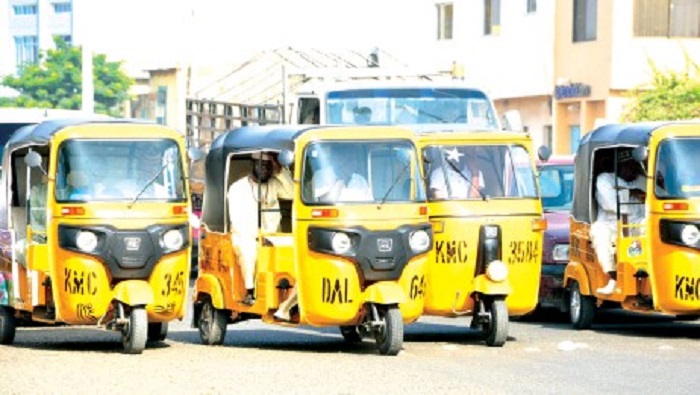The recent strike by tricycle operators in Kano has raised some very fundamental issues facing the state and others that depend on rents to survive and have no plans for the future.
No state in human history has ever existed without surplus exaction, the only difference is how it is done and for whose benefit. Fukuyama in his book ‘The Origins of Political Order’ described Nigeria and other sub-Saharan countries as libertarian’s paradise because of little or no taxes. “The region as a whole is a low tax utopia, with governments often unable to collect more than 10 per cent of GDP in taxes compared to 30 per cent in the United States and 50 per cent in parts of Europe”. Taxes apart from providing necessary government revenue for the public good, they are generally useful for the purpose of correcting market distortions to spur entrepreneurship and importantly for the re-distribution of wealth for social harmony. Nigeria has not achieved any of these.
Apart from taxation that helps in establishing the system and institutions, which we totally lack, we also have no plans for the future generations. There can never be progress if a society cannot organise itself and plan for the future. Do the people of Kano ever reflect on their future? Do they want to remain marginal or peripheral in the world, always depending on trickle down effects of the labour of others? Are they going to continue using tricycles for public transportation forever or until when some others invent another means of transportation? Do they want their city to remain in perpetual chaos without law and order? The recent two-day strike by tricycle operators in Kano is an opportunity.
Is it not the responsibility of the state to ensure that all citizens are gainfully employed and peace and order reign? This is the function of state. Kano was the most prosperous State in Black Africa 500 years ago when Leo Africanus visited this part of the world. All the pre-colonial visitors testified to this fact. The historian, Professor Abdullahi Mahadi, has traced this prosperity to the policies of the state up to 1750, which were consolidated by the Jihad of 1804. Professor Sule Bello has shown colonisation destroyed that economic independence and prosperity. But why did Kano maintain its position as the second most prosperous state until recently when it became relegated to number nine out of the 36 states of the federation? Briefly, it was number two because of some deliberate policies that encouraged commerce and manufacturing. Kano had the first textile mill in Nigeria, the Gwamaja Textile owned by the Kano Citizens Trading Company. It also had Bompai Industrial Estate, the largest industrial estate in Northern Nigeria constructed by the Native Authority under the leadership of Sir Muhammadu Sanusi (1953-63). Within the last few decades, so many things have happened and the only way out for the elite is to think out of the box. Dr. Muhammad Sagagi made this call from a highly professional perspective in January this year but no one cared.
One of the major reasons for the collective failure of the Kano society is the fact that the elite groups are yet to face reality that in Nigeria and the world, business will never be as usual. Knowledge is a major determining factor. It is a privilege to have people like Dr. Muhammad Sagagi who is the Deputy Chair of the Presidential Advisory Committee – he could help the state. But nobody even bothered to study, discuss (even in elite discussion groups) and digest his very important presentation to the alumni association of the National Institute, the cream of the elite. He outlined the causes of poverty in Kano and the fact that our economic growth does not generate employment. I add that our economy is driven by individuals’ instinct of necessity, and not state efforts. It is this survival instinct that triggered the transition from motorcycle taxis to tricycle taxis. In modern times, progress can never be achieved where, such pattern exists not based on knowledge and careful planning.
Prior to the abolition of motorcycle taxies, Kano was one the most chaotic and most polluted cities in Nigeria. The tricycle operators many of whom were motorcycle taxi operators, persist in this chaotic disposition. It is the responsibility of the government to ensure the safety of lives and properties of citizens as well as gainful employment for as many as possible through favorable economic policies. Based on these fundamentals the government should not abolish tricycles immediately but gradually with the full cooperation of the operators. Both should agree on the terms of the process of phasing-out tricycles.
The state government has decided that tricycle operators must pay N100 daily and the operators have agreed. This is good and very encouraging. But we need to think out of the box. There are various statistical versions of the number of tricycle operators from 65,000 to 200,000 therefore between N6.5 million and N20 million revenue could be exacted. The revenue should not just pass through normal channel unaccounted for. Every citizen of Kano is a stakeholder. In my humble opinion as an ordinary citizen I hereby put forward the following suggestions:
(i) The revenue from this tax or levy should be managed as a trust. Honest, non-partisan board of trustees with people of impeccable character from the distinguished members of the society as well as representatives of government and the tricycle operators should manage it. Yes people will ask why? The reason is that we are in difficult times and we need to generate trust and build our society according to the tenets of Islam that promote good governance. No matter the shortcomings of the TETFUND it has contributed more than any other innovation to the development of tertiary education in Nigeria. Kano State should learn from it.
(ii) The revenue from the tricycle (tax/levy) should be distributed in this percentage for the following purposes: 20 per cent health insurance for the contributor, 20% pension savings for the contributor, 20 per cent for designated rehabilitation of primary schools supervised by the board and 40 per cent for purchase of competitive buses (not conventional contract) for operations by the tricycle operators. The buses could be assembled by NTM and other funds for the project could be accessed based on the integrity of the trustees. The board should lease the buses to tricycle operators based on profitable commercial plan not as government venture. Proper study and management guidelines should be done. Routes for their operations should be designated and agreed.
The government, tricycle operators and other stakeholders can review the terms from time to time, since everyone has a stake. It is very possible that the tricycle operators will realise the individual benefits and even agree to contribute more in the long run. It is an opportunity for the government to harness this important resource, which could be an example for other states of the federation. When Yunus started his Grameen Bank and social business in Bangladesh no one anticipated his huge success and none contemplated his Nobel Prize achievement. Governor Ganduje should imagine the number of lives he could transform if he carefully plans for the future of tricycle operators in Kano. No subsequent administration can stop this if the major stakeholders reach a consensus on this important issue.
Ibrahim Ado-Kurawa is the Editor, Nigeria Year Book and Who is Who and can be reached via [email protected]

 Join Daily Trust WhatsApp Community For Quick Access To News and Happenings Around You.
Join Daily Trust WhatsApp Community For Quick Access To News and Happenings Around You.


